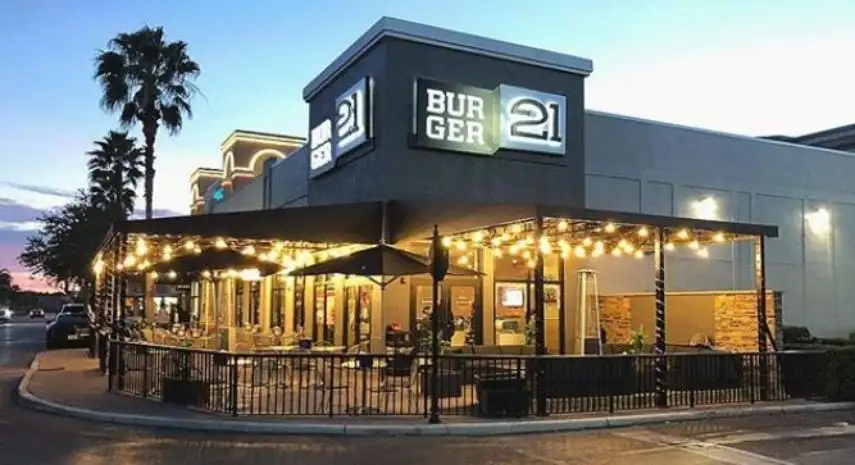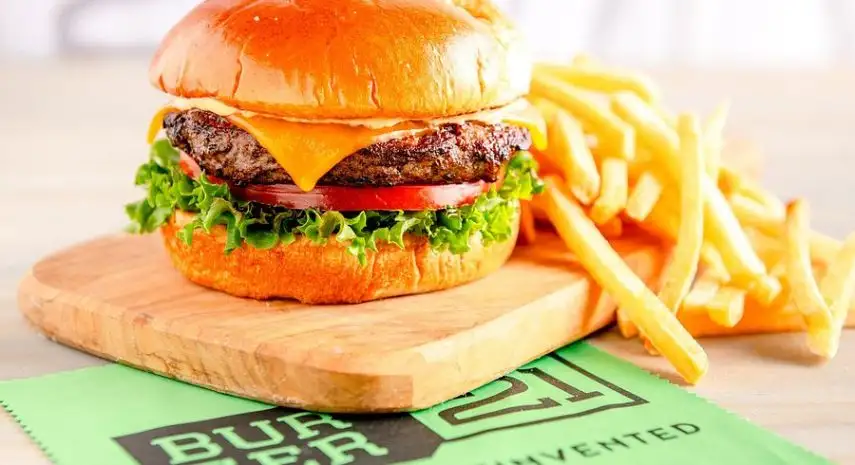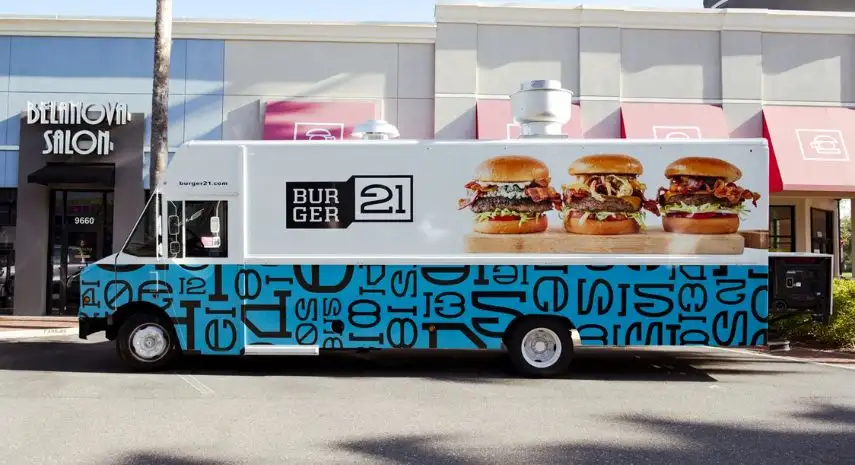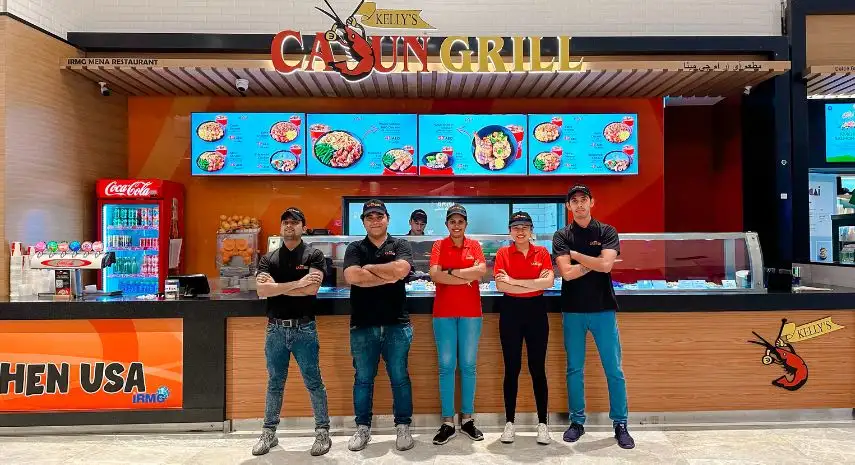Established
2009
Franchise Units
5
Minimum Investment
$250,000
Franchise Fee
$27,000
Total Investment Range
$1,085,164
Home Based
No
Description
Burger 21 is a fast-casual restaurant franchise that redefines the "better burger" experience. Founded in 2009 by Mark and Arlene Johnston, creators of The Melting Pot, the brand debuted in Tampa, Florida, in 2010. Since launching its franchise program in 2011, Burger 21 has expanded to over a dozen locations across the United States. The concept offers 21 chef-inspired burger creations, including beef, chicken, turkey, seafood, and vegetarian options, complemented by hand-crafted shakes, fresh salads, and a variety of sides. With its commitment to quality and innovation, Burger 21 has established itself as a leader in the gourmet burger segment.
Why Invest in This Franchise?
-
Proven Business Model: Burger 21's "Beyond the Better Burger" concept has garnered industry recognition, including being named one of Fast Casual’s Top 100 “Movers and Shakers” in 2014.
-
Strong Brand Identity: The brand's focus on chef-inspired menu items and a modern dining experience appeals to a broad customer base, driving consistent foot traffic.
-
Scalable Growth Potential: With a flexible store model and a growing national presence, Burger 21 offers opportunities for both single-unit and multi-unit franchisees.
-
Community Engagement: The brand's commitment to local involvement, including fundraising nights where 10% of sales are donated to local organizations, fosters strong community ties.
Background
Established Year: 2009
-
Franchise Units: As of 2024, Burger 21 operates over a dozen locations across several states, including Florida, Georgia, Illinois, Michigan, New Mexico, North Carolina, and Virginia.
-
Founders: Mark and Arlene Johnston
-
Brand Journey: Burger 21 opened its first location in Tampa, Florida, in 2010. By 2012, the brand began franchising, expanding its presence in various states. The company's growth is driven by its commitment to quality, innovation, and community engagement.
-
Ownership: Burger 21 is owned and operated by Front Burner Brands, a management company based in Tampa, Florida.
-
Market Presence in the USA: Burger 21 has established a strong presence in several states, with plans for continued expansion into new markets.
-
Industry Category: Fast-Casual Dining
Support Training
Burger 21 offers a comprehensive support and training program to ensure franchisee success:
-
Pre-Opening Training: In-depth operational training for franchisees and management teams at a certified training store.
-
On-Site Opening Support: Corporate trainers assist in-store before and after opening day to ensure flawless execution.
-
Operational Manuals: Step-by-step guides, SOPs, and ongoing best practice sharing.
-
Franchise Business Consultant (FBC): Each franchisee is assigned an FBC to assist with business start-up and growth, including financial analysis, operations evaluations, strategic planning, and brainstorming of new ideas.
-
Marketing Support: Access to an online asset management tool providing system-wide marketing materials and the ability to customize these materials for local use.
-
Real Estate Assistance: Support with site selection that meets specific criteria related to demographics, traffic patterns, parking, character of neighborhood, and competition from and proximity to other businesses.
-
Supply Chain Support: Assistance from the supply chain team in food procurement, leveraging centralized ordering, distribution, and re-distribution processes.
Ideal Candidate
Burger 21 seeks franchisees who are not just investors, but active business partners committed to growing the brand. The ideal candidate typically possesses the following attributes:
1. Business Background
-
Experience in restaurant operations, hospitality, or foodservice management is highly desirable, but not strictly mandatory.
-
A strong understanding of customer service, operational efficiency, and staff management helps ensure smoother franchise operations.
-
Multi-unit operators or entrepreneurs with experience scaling businesses are preferred for regional growth opportunities.
2. Passion and Commitment
-
Franchisees should have a genuine passion for food, hospitality, and creating memorable guest experiences.
-
Commitment to upholding Burger 21’s brand standards, menu quality, and customer service is crucial for long-term success.
3. Investment Capability
-
Minimum financial requirements include:
-
Liquid assets: $250,000
-
Net worth: $600,000 per unit
-
-
This ensures the franchisee can handle initial startup costs, working capital, and operational contingencies.
4. Location Preference & Market Focus
-
Candidates should be open to strategically located urban, suburban, or high-traffic areas where Burger 21 can capture both lunch and dinner traffic.
-
Emphasis is placed on demographics, foot traffic, and local community engagement for long-term profitability.
5. Entrepreneurial Mindset
-
Franchisees should be hands-on, proactive, and adaptable.
-
Ability to implement corporate systems while also innovating locally to drive marketing, promotions, and community engagement.
6. Alignment with Brand Values
-
Must embrace Burger 21’s vision of gourmet, customizable burgers and maintain quality across all operational aspects.
-
Demonstrates integrity, professionalism, and a collaborative attitude with the corporate team and other franchisees.
7. Operational Involvement
-
Ideal franchisees are willing to be actively involved in day-to-day operations, particularly during the first few years of establishment.
-
Focused on staff training, customer experience, and local marketing execution.
Financial Detail
| Financial Category | Estimated Cost / Fee | Notes |
|---|---|---|
| Initial Franchise Fee | $27,000 – $40,000 | Depends on the number of units developed |
| Total Initial Investment | $428,247 – $1,085,164 | Includes leasehold improvements, FFE, signage, inventory, and pre-opening expenses |
| Leasehold Improvements | $131,000 – $420,212 | Location-dependent |
| Furniture, Fixtures & Equipment (FFE) | $111,052 – $249,077 | Includes kitchen equipment, seating, and décor |
| Computer & POS Hardware/Software | $20,713 – $31,238 | For order processing, reporting, and inventory |
| Signage | $5,725 – $25,073 | Exterior and interior signs |
| 3 Months’ Rent | $17,322 – $37,500 | Based on location and lease terms |
| Security Deposit | $0 – $12,500 | Landlord-specific |
| Opening Inventory & Supplies | $22,132 – $28,316 | Initial food, beverage, and operational supplies |
| Royalty Fee | 5% of monthly gross sales | Paid to Burger 21 corporate |
| Marketing Fee | 1% to Advertising Fund + 3% local marketing | Corporate & local promotional activities |
| Minimum Liquidity Requirement | $250,000 | Ensures sufficient working capital |
| Minimum Net Worth Requirement | $600,000 | Per unit for financial stability |
| Expected ROI | Varies by location | Dependent on management, location, and market |
| Break-even Time | 18 – 24 months | Typical timeframe based on operational efficiency |
| Potential Revenue Streams | In-store dining, catering, online ordering, delivery | Expands market reach and profitability |







